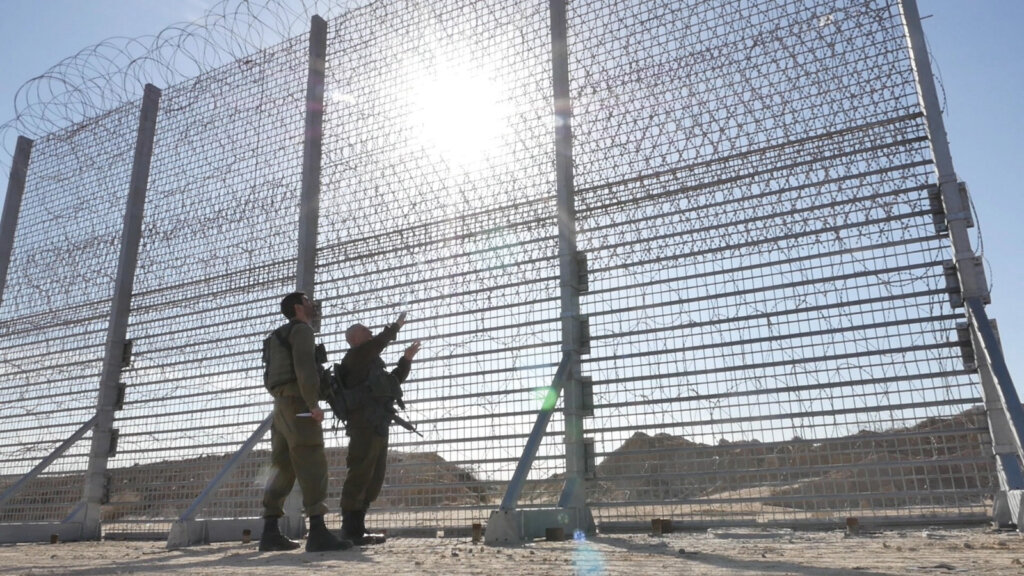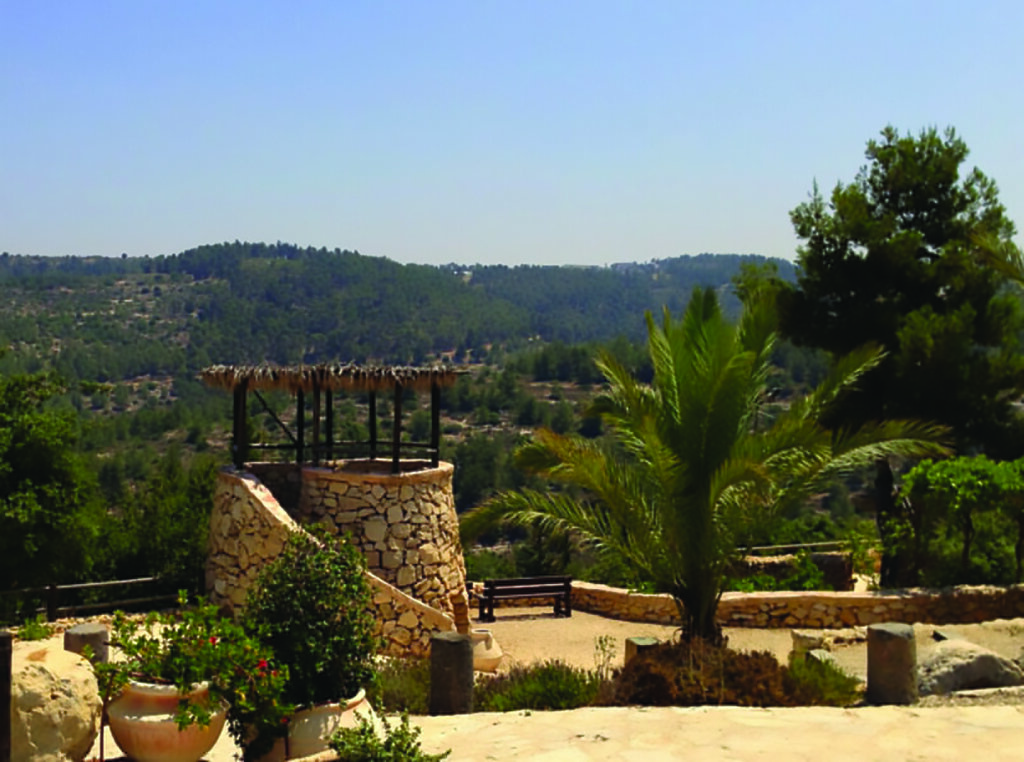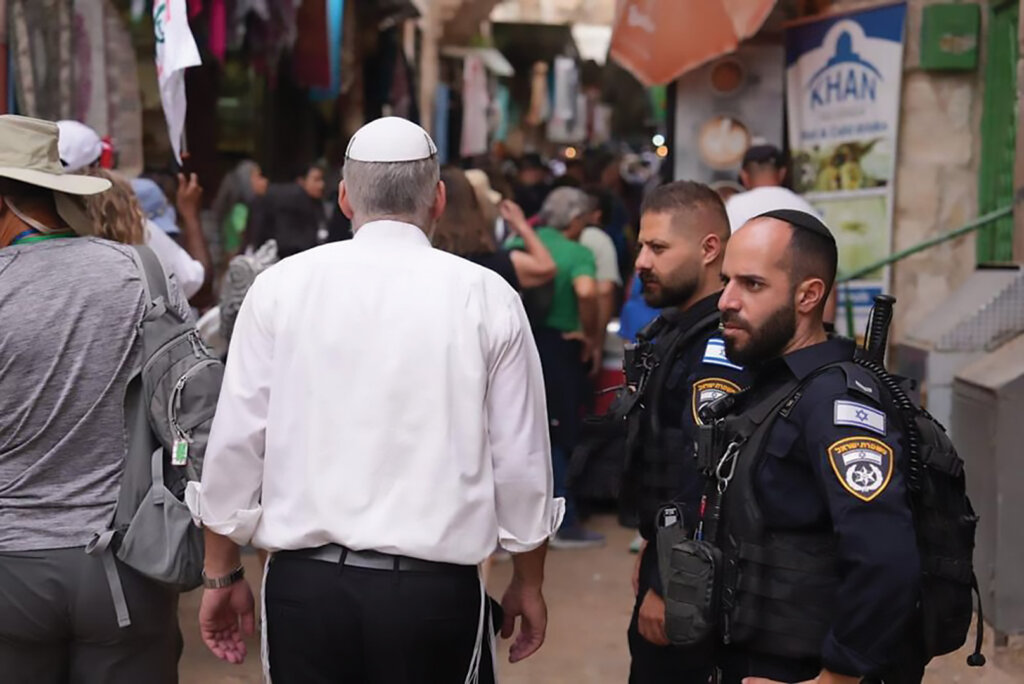The Year of The Watchmen
By Dr. Jürgen Bühler, ICEJ President
The horrific events of October 7th will be the subject of multiple investigations in Israel to determine what went wrong that fateful day. Already, many Israelis foresee numerous top political and military leaders being replaced. But one of the greatest failures is already known: the failure of the watchmen in Israel. To be more precise, military and intelligence officers higher up the chain failed to heed the warnings they had received from the watchmen.

In the weeks and even hours just before the attacks, multiple signs of an imminent attack were noted by observers who constantly watch countless security cameras along the Gaza border fence. But their warnings were dismissed. The prevailing assessment by senior officers was that Hamas would never dare try to breach the most secure border on earth. The price of this flawed consensus was the brutally inhumane acts committed by Hamas terrorists and even Gazan civilians, which have cost Israel nearly 1,500 lives so far.
It was like the prophet of old warned: “…because they have seduced My people, saying, ‘Peace!’ when there is no peace…” (Ezekiel 13:10). Or when Paul said: “For when they say, ‘Peace and safety!’ then sudden destruction comes upon them, as labour pains upon a pregnant woman. And they shall not escape.” (1 Thessalonians 5:3)
Israel has always served as an example for the Church, as Paul taught in 1 Corinthians 10:11. Indeed, recent events in Israel serve as sober, powerful lessons for the Church and every individual believer today.

Many times in the Bible, we are told to be watchful. The watchman plays a central role in the Word of God. Jesus admonished the disciples to “watch and pray” on the night he was betrayed (Matthew 26:41). The Hebrew prophets saw themselves as watchmen for the nation (Ezekiel 3:17). In troublesome times, the prophet Habakkuk even decided to climb a watchtower to hear what the Lord would say to him (Habakkuk 2:1f).
Eerdmans Dictionary of the Bible describes a watchman as one whose duty it is to keep vigil, often on a tower or wall, whether for the king (1 Samuel 14:16), over a city (Song of Solomon 3:3), or over a field (Isaiah 56:9-10). They carry out their task often at night (Psalm 127:1). Paul even counsels the church at Ephesus to be watchful of “savage wolves” preying on the flock (Acts 20:28-32).
The events in Israel are a call to all believers to examine our own watchfulness and prayer habits. It is perilous that in many prosperous Western churches, the office of the watchman is neglected or non-existent.

In Israel today, watchmen (shomrim in Hebrew) are part of daily life. They are at the entrances of communities, supermarkets, shopping malls, office buildings, and elsewhere. The more important the task, the younger and better trained they are. The watchmen who guard the President’s House and Prime Minister’s Office are some of the best trained security forces in Israel, as these sites are under constant threat. Without these watchmen, more terror attacks would get through.
The Bible gives us four areas where watchmen are needed in the Kingdom of God to stand guard over our personal or communal watch tower.
1) The Personal Watchmen
Everyone needs to be a watchman! A main characteristic of Israeli society is that virtually everyone has a duty as a watchman. A relatively high percentage of Israeli citizens carry a weapon, and many times these armed civilians are first on the scene of terrorist attacks and save lives.
The Bible calls on all of us to be watchful at all times. “Be sober, be vigilant; because your adversary the devil walks about like a roaring lion, seeking whom he may devour. Resist him, steadfast in the faith, knowing that the same sufferings are experienced by your brotherhood in the world.” (1 Peter 5:8-9) The believer is constantly surrounded by an enemy whose aim is to steal, kill and destroy (John 10:10). Satan wants to destroy your family, your calling, and your walk with the Lord. It should make us think that so many prominent leaders in the Church, though powerfully used by God, came under attack and their ministries fell.
But it is not just the devil who can cause great harm to God’s people; often it is the weakness of the believer. In his anguish at Gethsemane, Jesus warns his disciples: “Watch and pray, lest you enter into temptation. The spirit indeed is willing, but the flesh is weak.” (Matthew 26:41) Jesus further teaches that two things are needed to overcome our fleshly desires: prayer and a state of spiritual alertness. Today, our fleshly desires are more under assault than ever as pornography and other perverted, sensual offerings are just a mouse click away.
One main reason for the lack of watchfulness among many believers is the great misconception that by joining the Kingdom of God, we think we have joined a nice country club with wonderful people as members. The Kingdom should be a place of righteousness, peace and joy. But, we also have joined an army in a state of war against Satan and this war will only intensify as the Day of the Lord draws closer. That is why Paul addresses his disciple Timothy as a soldier that needs to live according to the strict military discipline (2 Timothy 2:3-4). Undoubtedly, we live in a time of increased spiritual conflict, and we do well to remain alert to our own weaknesses and any outside attack.

Now the most important question is what to do with the intelligence gathered as watchmen? It is one thing to see danger, but even more important is what to do in response. As I write this teaching, a security incident just happened in our village. A suspicious situation arose in our street that my dear wife Vesna noticed. She immediately contacted the head of security in our community, the matter was taken seriously, and positively impacted security procedures in our village.
That means, as believers, we take these matters to the head of our security, the captain of our salvation, to Jesus and let him deal with it. That is why Jesus asked his disciples to watch and pray.
2) The Community Watchmen
My wife’s personal alertness also benefited the whole community. In the same way, we are called to be watchmen for those around us, our families, our brothers and sisters in the Lord, and even our nations.
There is one area that the Word of God admonishes us to be especially watchful. Both Jesus and the Apostles warned that deceptions would come in the last days. Easy doctrines may tickle our ears, but they have little substance. Especially as leaders or elders in the work of God, we are called to be alert.
Again, Paul warned the church at Ephesus: “Therefore take heed to yourselves and to all the flock, …. For I know, that after my departure savage wolves will come in among you, not sparing the flock. Also from among yourselves men will rise up, speaking perverse things, … Therefore watch….” (Acts 20:28–31).
Paul also wrote to his understudy Timothy: “Keep a close watch on yourself and on the teaching. Persist in this, for by so doing you will save both yourself and your hearers.” (1 Timothy 4:16 / ESV) This warning indicates that not just others can be wrong, but Paul said, “watch yourself”. Derek Prince once said Christians who believe they cannot be deceived are already deceived. We all need to watch ourselves and immerse daily in the Word of God and prayer.
The Temple in Jerusalem had a special group of 4,000 Levites who served as ‘gatekeepers’ (1 Chronicles 23:5). Their functions varied, as they guarded the ark of the covenant while on the move, the finances or the entrance of the Temple. Their work was an essential part of the House of God.
Today, we need the gift of discernment more than ever. What we need is not a physically strong bouncer to keep the wrong people from our services, but people of spiritual discernment to keep the wrong worldly influences from impacting the Church. The main purpose of the gatekeepers was not to create a cozy atmosphere for worship with the right people, but to assure that God’s glorious presence would be welcome in His own House. Rather than seeker-friendly churches, we need them to be God-friendly. For if His glory is there, the church will surely be a magnet for the lost.
3) The Prophetic Watchman
The Hebrew prophets were called to be watchmen for Israel (Ezekiel 3:14). Their task was to keep watch over Israel’s spiritual condition. But they also served as watchmen on a national level, warning Israel at times of imminent danger and giving heavenly strategies to the king. They were God’s mouthpiece to the nation, identifying what needed to change, warning of threats, and clarifying the purposes of God in the near and distant future.
An important task of this office is to recognise the times and seasons in which we are living. The Bible applauds the tribe of Issachar as men “… who had understanding of the times, to know what Israel ought to do…” (1 Chronicles 12:32)
The Body of Christ today needs believers like these men of Issachar. It requires more than just observing the cultural shifts in music or messaging to brighten our 90-minute Sunday service. Rather, there are seismic shifts taking place in the heavenly realm. Watchmen need to understand, like Daniel did, that our world is governed less by the leaders we vote into office and more by “… principalities, against powers, against the rulers of the darkness of this age, against spiritual hosts of wickedness in the heavenly places.” (Ephesians 6:12) This type of intelligence is gained in prayer and intercession, and by the gifts of the Spirit.
There are great spiritual upheavals taking place in the Islamic world in our day. In recent decades, the number of Muslims finding Jesus as their redeemer is growing exponentially, yet we also are seeing an explosion of radical Islam manifesting not just in the Middle East but worldwide. Like in the time of Isaiah (21:11ff), when people inquired about Dumah (today’s Arabian peninsula), watchmen are needed to assess the times and to give insights and strategies for victory for the Church.
Our societies face other unprecedented challenges, such as Artificial Intelligence and gender confusion. Yet the biggest change in the spiritual landscape is the restoration of Israel, which has massive implications for the Church, especially as it will eventually bring the return of the Lord. However, this seems to be largely ignored by most churches today.
Habakkuk lived in a time of tremendous shakings, yet he made a strategic decision: “I will stand my watch and set myself on the rampart, and watch to see what He will say to me, and what I will answer when I am corrected.” (Habakkuk 2:1)

This, more than ever, is a call to the Body of Christ to man our watchtowers and see what the word of the Lord is for our time, so we can act like the sons of Issachar and pray strategically.
The place where watchfulness is most needed concerns the return of Jesus. More than in any other context, we are admonished to be watchful of his coming. The reason is very simple. Jesus said that we will not know exactly when he is coming (Matthew 24:36, 39, 42, 44, 50). It will catch us by surprise and the best way to be prepared is just to be watchful. Spiritual drowsiness and living Christianity on auto-pilot is dangerous. What is available to help us drive our cars with ease does not work in the Kingdom of God.
Therefore, Paul writes to the church in Thessalonica: “For you yourselves know perfectly that the day of the Lord so comes as a thief in the night. For when they say, ‘Peace and safety!’ then sudden destruction comes upon them… Therefore let us not sleep, as others do, but let us watch and be sober.” (1 Thessalonians 5:2-6)
Being alert means we invite afresh the Holy Spirit every day to speak to us, to have a lifestyle of prayer and studying God’s Word. Exceptional times require exceptional measures.
4) Watch and Pray
In the Bible, watchmen are often associated with prayer. The prayer movement of the ICEJ takes its inspiration from Isaiah 62:6-7: “I have set watchmen on your walls, O Jerusalem; They shall never hold their peace day or night. You who make mention of the Lord, do not keep silent, and give Him no rest till He establishes and till He makes Jerusalem a praise in the earth.”
The watchmen of Isaiah 62 serve two functions. They make their rounds day and night to constantly remind the community of its need for alertness. They know it would be wrong to assume a moment of safety for the city and people of God. Now, in order to assure this safety and destiny, they also “remind the Lord” of His promises to Israel. They pray unceasingly for the full restoration of Jerusalem until its ultimate destiny is reached. And Isaiah foresees a coming time when these dual tasks are completed.
In a way, these watchmen look out for imminent and future threats, but they also look beyond to the heavenlies, to the promises of God that still await fulfilment, and pray as long as it takes to see them come to pass.
Thus, watching and praying always go hand-in-hand. The good news is that as we use the powerful weapon of prayer, we are aiming for victory. It is the praying watchmen who do great exploits. Much can be changed and accomplished through prayer, and particularly through corporate prayer.
The reason God calls the watchman is not so he can watch the decay and fall of the world and thus become a bearer of bad news who sees nothing good coming ahead. On the contrary! He is called to the watchtower for an express purpose. “… until I make Jerusalem a praise on the earth.” (Isaiah 62:7)
A Call to Action
In conclusion, I strongly encourage you to become a watchman for your own personal life and your family, as well as for the community where the Lord has placed you. Ask the Lord to give you the needed divine intelligence to stand against the wicked schemes of the enemy and to carry out great exploits in these days of much upheaval.
I also invite you to join our global Isaiah 62 prayer campaign. In doing so, you will join a mighty host of watchmen who are standing with Israel in this critical time. We are praying not only for Israel in the current conflict, but also reminding the Lord about the glorious future He has promised to His people. So, make 2024 your year as a watchman.
May the Lord bless you greatly as take your stand on the walls of Jerusalem!